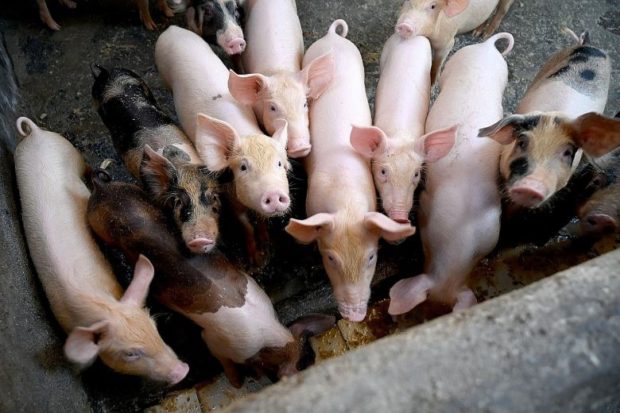African swine fever: Thousands rally in Indonesia against planned culling

African swine fever has left over 40,000 pigs dead in North Sumatra in the past few months. AFP Photo
JAKARTA — Thousands of people, including pig breeders and restaurant owners, have staged a rally in Medan, the provincial capital of North Sumatra, to protest against a plan to cull pigs to curb African swine fever.
Provincial governor Edy Rahmayadi disclosed the plan last month to halt the spread of the disease, which left more than 40,000 pigs dead in the past few months.
But many Batak people, who are predominantly Christian and a sizable minority in North Sumatra, oppose the plan. They have formed a movement called #SaveBabi to try and overturn it. Babi means pig in Bahasa Indonesia.
The movement’s leader, Mr Boasa Simanjuntak, described Monday’s “102 Rally” – named after the date and month of the event – as an expression of “pig sovereignty” acknowledged by the Bataks and pork lovers, as well as those whose livelihood depends on the livestock.
“With this sovereignty, these living creatures must be saved despite their critical condition,” he told The Straits Times on the phone from Medan. “We strongly oppose the plan to cull the pigs. Other solutions must be sought.”
Article continues after this advertisementThe Bataks make up one of the biggest minority groups in Indonesia, the world’s most populous Muslim-majority country.
Article continues after this advertisementOver 90 per cent of the country’s population of some 260 million are Muslims forbidden from eating pork or rearing pigs.
The Bataks, however, have raised pigs for many generations. The animals are used in various cultural ceremonies from birth to death, including as dowry in marriage proposals.
For Batak Christians, Mr Boasa said, “pigs have an absolute, irreplaceable position”.
The pig herd in North Sumatra was first hit by hog cholera in late September last year. It was followed by the African swine fever, which has also taken a toll in at least 11 Asian countries, including South Korea, the Philippines, Vietnam, Myanmar, Cambodia and Timor-Leste. The disease broke out initially in China in August 2018.
The #SaveBabi movement appealed to President Joko Widodo’s administration to avoid culling the pigs and, among other things, has demanded that the government provide compensation to pig breeders whose losses, said Mr Boasa, have hit over 1 trillion rupiah (S$101.5 million) as of early last month.
The Agriculture Ministry’s livestock and animal health services director-general I Ketut Diarmita has refuted all the allegations, saying that African swine fever is a new disease and a vaccine has not yet been developed worldwide.
“Until now, an effective vaccine for prevention remains unavailable,” he said in a statement.
Denying a plan of mass culling, he said: “Our main strategy is to enhance biosecurity and curb the movement (of pigs).”
Agriculture Ministry animal health director Fadjar Sumping Tjatur Rasa told The Straits Times that the recent massive pig deaths have not disrupted Indonesia’s live pig exports, and the animals shipped from Bulan Island in Riau Islands province complied with Singapore’s biosecurity standards.
There are about 30 countries approved to export pork and pork products to Singapore, and imports from areas affected by swine fever outbreaks have been suspended.